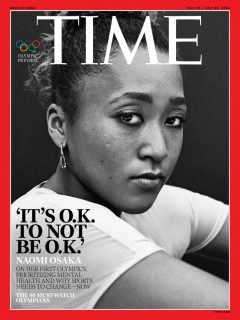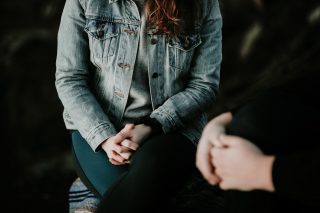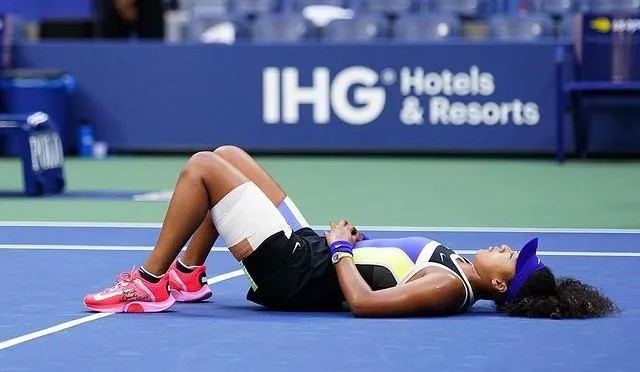We’re in a mental health pandemic. According to a study published in Scientific Report that used information from 32 different countries and 398 771 participants, the global prevalence estimate for depression was 28.0%, 26.9% for anxiety; 24.1% for post-traumatic stress symptoms; 36.5% for stress; 50.0% for psychological distress; and 27.6% for sleep problems.
Considering the fact that the world literally came to a standstill a little over a year ago, it should come as no surprise to learn that a lot of people are battling with their mental health, including future tennis legend Naomi Osaka.
Earlier this year, the world number two was fined $15 000 and threatened with disqualification after she revealed that she would not be participating in mandatory media commitments in order to preserve her mental well-being. Now, in a personal essay for TIME, the 23-year-old speaks about what transpired before she withdrew from the French Open.
Naomi Osaka Takes Control of Mental Health
Before the French Open, the four-time grand slam winner revealed that she would not be partaking in media conferences, adding that they trigger anxiety and that the interactions often create doubts in her during her matches. She also shared that she has experienced bouts of depression in recent years,

Photograph by Williams & Hirakawa—AUGUST
“Believe it or not, I am naturally introverted and do not court the spotlight,” she writes, “I always try to push myself to speak up for what I believe to be right, but that often comes at a cost of great anxiety.”
Osaka was then fined $15,000 for opting out of her mandatory news conference and threatened with disqualification or suspension if she continued to avoid the media. As of now, the Japanese native has not played in a tournament since Paris, and she missed Wimbledon. The plan is for her to return to the court at the Tokyo Olympics, where she’ll be representing Japan.
Mental health in the workplace
Oftentimes, our jobs can become mentally draining, and for some, the workplace environment does not properly address the mental health issues experienced by their employees. Unfortunately, in workplace areas, mental health issues still carry a stigma, and it appears that the stigma also exists on the tennis courts,
“I communicated that I wanted to skip press conferences at Roland Garros to exercise self-care and preservation of my mental health,” writes Naomi. “I stand by that. Athletes are humans. Tennis is our privileged profession, and of course, there are commitments off the court that coincide. But I can’t imagine another profession where a consistent attendance record (I have missed one press conference in my seven years on tour) would be so harshly scrutinized.”
We’re only human

Williams & Hirakawa—AUGUST/TIME
“There can be moments for any of us where we are dealing with issues behind the scenes,” Osaka says.“Each of us as humans is going through something on some level.”
“Perhaps we should give athletes the right to take a mental break from media scrutiny on a rare occasion without being subject to strict sanctions.”
A mental health revolution
“The intention was never to inspire revolt, but rather to look critically at our workplace and ask if we can do better,” writes Osaka.
While at the time she was fined and criticized by the tennis organizations (as well as Rafael Nadal and Ash Barty who said that they appreciate her mental health stance, but still considered speaking to reporters as part of the job), the leaders of the tournament have done an about-turn. In fact, have signed a pledge to address players’ concerns about mental health.
“I have numerous suggestions to offer the tennis hierarchy, but my No. 1 suggestion would be to allow a small number of ‘sick days’ per year where you are excused from your press commitments without having to disclose your personal reasons. I believe this would bring the sport in line with the rest of society.” writes the 2020 US Open Champion.
Media training
In regards to the media, Osaka shares that the backlash forced her to share her symptoms, a situation that she hopes no one else will have to experiece,

Mental Health Photo by Priscilla Du Preez on Unsplash
“In my case, I felt under a great amount of pressure to disclose my symptoms—frankly because the press and the tournament did not believe me.” she writes, “I do not wish that on anyone and hope that we can enact measures to protect athletes, especially the fragile ones. I also do not want to have to engage in scrutiny of my personal medical history ever again. So I ask the press for some level of privacy and empathy next time we meet.”
Support structure
It’s important to take steps to protect your mental health, however, it’s also important to ensure that you have a strong support structure to help you on your journey and that’s something the 2019 China Open winner understands,
“I want to thank everyone who supported me,” she writes. “There are too many to name, but I want to start with my family and friends, who have been amazing. There is nothing more important than those relationships. I also want to thank those in the public eye who have supported, encouraged, and offered such kind words. Michelle Obama, Michael Phelps, Steph Curry, Novak Djokovic, Meghan Markle, to name a few.”
You are not alone
Current statistics indicate that over 900 million people worldwide are currently dealing with a mental health or substance abuse disorder. Following her decision to prioritize her mental health, Osaka soon realized that she wasn’t the only one struggling,

Maridav/Shutterstock
“It has become apparent to me that literally everyone either suffers from issues related to their mental health or knows someone who does,” she writes. Now while her taking a step back to care for herself ironically placed her in an even bigger spotlight, Osaka understands the role that she’s been given
“I feel uncomfortable being the spokesperson or face of athlete mental health as it’s still so new to me and I don’t have all the answers.” she pens, “I do hope that people can relate and understand it’s O.K. to not be O.K., and it’s O.K. to talk about it. There are people who can help, and there is usually light at the end of any tunnel.”
She added that an Olympic winner reminded her just how important her new role is:
“Michael Phelps told me that by speaking up I may have saved a life,” Osaka wrote.“If that’s true, then it was all worth it.”
Want to know more?
The Duke of Sussex is openly speaking about his mental health journey. In a new show, Harry touches on the mental toll of losing his mother at a young age. He also shared how his wife, Meghan Markle, convinced him to start going to therapy.
References
Nochaiwong, S., Ruengorn, C., Thavorn, K. et al. (2021). Global prevalence of mental health issues among the general population during the coronavirus disease-2019 pandemic: a systematic review and meta-analysis. Sci Rep 11, 10173. https://doi.org/10.1038/s41598-021-89700-8



![women [longevity live]](https://longevitylive.com/wp-content/uploads/2020/01/photo-of-women-walking-down-the-street-1116984-100x100.jpg)










